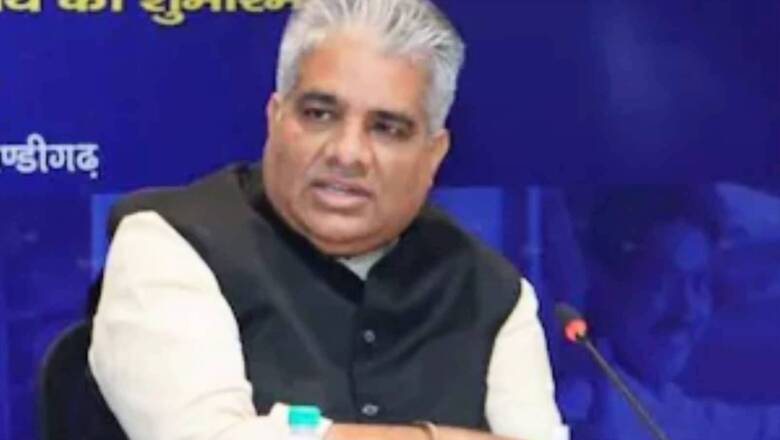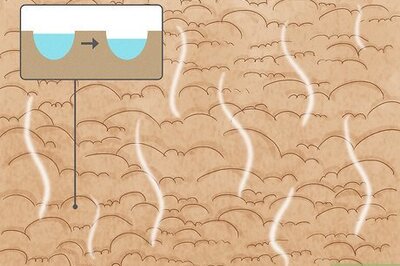
views
One of the top priorities of the government and Prime Minister Narendra Modi has been the nagging issue of climate change. As union environment minister Bhupender Yadav heads for the COP27 summit in Egypt’s Sharm El Sheikh, in an e-mail interview he shared with News18.com India’s plans and priorities. At the climate summit, India will insist on action and a clear framework, especially from developed countries.
But this trip and stand by India come even as the national capital region (NCR) is in the grip of severe air pollution, with the Aam Aadmi Party (AAP)-run Punjab and Delhi governments pushing the blame towards the Centre. The most nagging issue is stubble burning. The minister told News18.com about the steps that can be taken to control this and how India must now look at environment-friendly steps and alternatives to plastics. Edited excerpts:
There has been much debate and discussion on how much stubble burning contributes to pollution. The Punjab government says it’s tough to overrule the concerns of the farmers. What do you have to say?
Emissions from crop residue burning in Punjab and Haryana adversely affect Delhi pollution. Vehicles (exhaust & re-suspended dust), C&D, fugitive emissions from industries including crop residue burning add to the poor air quality of Delhi.
With respect to the prevention and control of paddy stubble burning:
(i) MoEF&CC in coordination with CAQM, has finalised a policy to curb the air pollution menace occurring every year in Delhi and National Capital Region
(ii) The policy contains sector-wise recommendations to prevent, control and abate air pollution in the NCR including crop residue burning
(iii) The said policy with timelines has been sent to the NCR states including Punjab for implementation
(iv) Based on the framework issued in 2021 and learnings from gaps and deficiencies observed during the last paddy harvest season, the detailed plan for paddy harvesting season 2022 has been updated/revised by the states of Haryana, Punjab and Uttar Pradesh
(v) These states have submitted preparatory actions for implementation of their respective plan of action for prevention and control of paddy stubble burning
(vi) CAQM has reviewed the action plan for Punjab with the chief secretary, Punjab, and ACS (Agriculture), Punjab
(vii) CAQM has been repeatedly pursuing the matter with the state agencies for strengthening the action plan for various ex-situ and in-situ applications for control of paddy stubble burning.
(viii) ISRO has been roped in for recording and monitoring of crop residue burning events, which shall avoid a diverse assessment of fire events/counts
Apart from that, I have been convening regular meetings with CAQM, major central ministries, and state government departments including chief ministers and chief secretaries with the following objectives:
• To assess the preparedness to deal with the cause of air pollution in the ensuing winter season
• To explore the use of parali as resources in thermal power plants, fodder, feedstock for 2G ethanol power plants, feedstock in compressed biogas plants, fuel in industrial boilers, WTE plants, brick kilns packaging materials, agri-panels, and other eco-friendly applications
• In-situ bio-decomposition of parali using proven technology and set a target for the year
• Review of preparedness by thermal power plants in NCR for using biomass pellets as a supplement to coal fuel
• Review on the prevailing status of fire events and air quality
• Strict action plan for the control of pollution based on monitored values of the air pollution level and speed of air on Dussehra, Diwali, and during the crucial period of harvesting and next sowing of crops
I convened a VC meeting on 11.10.2022 with state environment ministers of Delhi and NCR states and Punjab to review the action plan for air quality management in Delhi-NCR in the coming winter.
Diwali has been blamed for the spike in AQI. But the figures put out by the environment ministry show that this is not entirely the case. Do you agree?
Most of the time, firecrackers are burned in excess leading to rapid increase in air pollution and noise pollution. Owing to meteorology, it may also contribute to local and regional air pollution.
The Hon’ble Supreme court of India banned the traditional crackers containing pollution-causing barium nitrate back in 2018, promoting the use of green crackers instead.
Green crackers are environmentally friendly fireworks and can reduce the air pollution caused by traditional firecrackers.
Is there a technology and alternative which is cheaper for stubble burning?
Bio-decomposer for in-situ crop residue management is a cheaper alternative to stubble burning in NCR. A bio-decomposer formulation was developed by Pusa and is one of the vital in-situ stubble management options. Further, to ease the process, M/s Nurture Farms has partnered with IARI for licensing and enhancing the Pusa bio-decomposer technology in a powder form that is readily sprayable with water solution.
To make the bio-decomposer application successful and effective, it is to be ensured that application is carried out in conjunction with appropriate CRM machinery for adequately mixing the same with the soil as well as light irrigation to facilitate faster and effective bio-decomposition of the stubble.
Upon my request, Hon’ble Minister, A&FW, informed that provisions have been incorporated under CRM scheme for conducting large-scale demonstration of bio-decomposer technologies on the farmers’ fields by state governments, Krishi Vigyan Kendras (KVKS) and institutions under ICAR. It has been stated that financial requirements towards the same may be met from flexi funds being provided under the scheme, and tractor operated sprayer (boom type) and self-propelled high ground clearance sprayers (boom type), which are used for spraying bio-decomposer formulations are already covered for financial assistance under Sub-Mission on Agricultural Mechanization (SMAM).
You have pitched for environment-friendly options, a ban on single-use plastics and to look for viable alternatives. Do you suggest any incentives to small start-ups and industries that want to recycle waste and use it to produce alternatives?
Several start-ups are using agrowaste and plant residue to manufacture alternatives.
• Schemes from DPIIT, Startup India, MSME provide incentives to these start-ups and industries in the field of manufacturing alternatives to plastics.
• Under the “India Plastic Challenge – Hackathon 2021” organised by the ministry of environment, forest and climate change, for start-ups and students of colleges and universities, two startups were awarded for developing alternatives to single-use plastics. One startup developed a completely biodegradable alternative to thermocol from paddy straw waste (parali) and the other developed packaging material from seaweed.
• Recently, a National Expo on alternatives to banned single-use plastics items and Conference of Startups-2022, was organised by MoEFCC and Government of Tamil Nadu in Chennai on 26th and 27th September 2022. More than 150 manufacturers of eco-alternatives from across the country are participating in the expo. The eco-alternatives included items made from natural fibres such as coir, bagasse, rice and wheat bran, plant and agricultural residue, banana and areca leaves, jute, and cloth. The Conference of Startups provided a platform to exchange views amongst innovators and financial institutions, and government departments supporting start-up ecosystems in the country
• The enforcement of ban on identified single-use plastic items will allow the alternatives to replace the banned items
When we say no to plastics, we save the environment. But what about jobs, those involved in these plastic factories?
• To encourage, the transition from manufacturing of banned SUP items, the ministry of micro, small and medium enterprises (MSMEs) is providing support to enterprises under various schemes of the ministry, with respect to technology up-gradation, creating awareness, marketing support, infrastructural support and for adopting alternatives to identified single-use plastics, as per scheme guidelines
• The manufacturing of alternatives will create newer employment opportunities and new business models will develop
• The ban would help protect and conserve the environment which will ensure sustainable development
• The manufacturing and supply of alternatives have provided an opportunity for new livelihood opportunities and business models to develop. It has been seen that many self-help groups are making alternatives from locally available materials and bio-resources.
We saw during Chhat how much the Yamuna was foamed. It’s a health hazard and ambitious Yamuna cleaning work has not worked. What’s the choice for people there then?
River Yamuna is polluted in Delhi stretch, downstream of Wazirabad barrage. Two major factors are- (a) lack of fresh water/dilution in the river system, (b) discharge of industrial and domestic wastewater.
Options are: (a) Revival of Najafgarh Jheel, which can bring fresh water into Najafgarh drain and Yamuna, (b) control of nitrogen and detergent-containing discharge from textile mills, and (c) control of discharge of untreated sewage.
Read all the Latest India News here

















Comments
0 comment